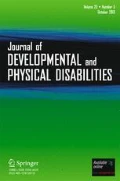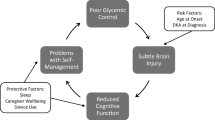Abstract
Type 1 Diabetes Mellitus is one of the most common illnesses found in children under the age of 18 as well as in young adults. Symptoms of this disease, including those with and without severe hypoglycemia, create abnormal blood glucose levels along with abnormal insulin levels. These abnormal chemical levels have been associated with neurocognitive deficits in memory, attention, motor skills, visuospatial abilities and executive functioning. In this paper, available literature on the central nervous system changes associated with the effects of insulin-dependent diabetes on school-aged children and young adults is reviewed. Implications for learning as well as a neurobiological cause of executive function deficits are discussed.
Similar content being viewed by others
References
Auer, R. N., & Siesjo, B. K. (1988). Biological differences between ischemia, hypoglycemia, and epilepsy. Annals of Neurology, 24, 699–707.
Bax, M., Tydeman, C., & Flodmark, O. (2006). Clinical and MRI correlates of cerebral palsy. Journal of the American Medical Association, 296, 1602–1608.
Bjorgass, M., Ganse, R., Vik, T., & Sand, T. (1997). Cognitive function in Type 1 children with diabetes with and without episodes of severe hypoglycaemia. Acta Paediatrica, 86, 148–153.
Brady, F. (2000). Cognitive and psychosocial functioning in preschool-aged children with T1DM. Diabetes, 5, 49.
Davis, E. A., Trundle, C. L., Ives, J., Robins, P. D., & Jones, T. W. (2002). High prevalence of structural CNS abnormalities in children with early onset diabetes. Diabetes, 51, A3.
Deary, I. J., Sommerfield, A. J., McAuley, V., & Frier, B. M. (2003). Moderate hypoglycaemia obliterates working memory in humans with and without insulin treated diabetes. Journal of Neurology, Neurosurgery and Psychiatry, 74, 278–279.
Desrocher, M., & Rovet, J. (2004). Neurocognitive correlates of Type 1 Diabetes Mellitus in childhood. Child Neuropsychology, 10, 36–52.
Diabetes Control and Complications Trial Research Group. (1996). Effects of intensive diabetes therapy on neuropsychological functions in adults in the diabetes control and complications trial. Annals of Internal Medicine, 124, 379–388.
Ferguson, S. C., Blane, A., Perros, P., McCrimmon, R. J., Best, J. J. K., Wardlaw, J., et al. (2003). Cognitive ability and brain structure in Type 1 diabetes: relation to microangiopathy and preceding severe hypoglycemia. Diabetes, 52, 149–156.
Ferguson, S. C., Blane, A., Wardlaw, J., Frier, B. M., Perros, P., McCrimmon, R. J., & Ceary, I. J. (2005). Influence of an early-onset age of Type 1 diabetes on cerebral structure and cognitive function. Diabetes Care, 28, 1431–1437.
Fox, M. A., Chen, R. S., & Holmes, C. S. (2003). Gender differences in memory and learning in children with insulin-dependent diabetes mellitus (IDDM) over a 4-year follow-up interval. Journal of Pediatric Psychology, 28, 569–578.
Frier, B. (2001). Hypoglycemia—Clinical consequences and morbidity. International Journal of Clinical Psychology: Supplement, 11(3), 51–55.
Gabrielli, J. D. E., Brewer, J. B., Desmond, J. E., & Glover, G. H. (1997). Separate neural bases of two fundamental memory processes in the human medial temporal lobe. Science, 276, 264–266.
Geschwind, N., & Galaburda, A. M. (1985). Cerebral lateralization: Biological mechanisms, associations, and pathology. Boston: MIT.
Golden, M. P., Ingersoll, G. M., Brack, C. J., Russell, B. A., Wright, J. C., & Huberty, J. C. (1989). Longitudinal relationship of asymptomatic hyperglycemia to cognitive functioning in IDDM. Diabetes Care, 12, 89–93.
Gschwend, S., Ryan, C., Atchison, J., Arslanian, S., & Becker, D. (1995). Effects of acute hypoglycemia on mental efficiency and counterregulatory hormones in adolescents with insulin-dependent diabetes mellitus. Journal of Pediatrics, 126, 178–184.
Hagen, J. W., Barclay, C. R., Anderson, B. J., Freeman, D. J., Segal, S. S., Brown, G., et al. (1990). Intellective functioning and strategy use in children with insulin-dependent diabetes mellitus. Child Development, 61, 1714–1727.
Hannonen, R., Tupola, S., Ahonen, T., & Riikonen, R. (2003). Neurocognitive functioning in children with type-1 diabetes with and without severe hypoglycemia. Developmental Medicine & Child Neurology, 45, 262–268.
Hershey, T., Craft, S., Bhargava, N., & White, N. H. (1997). Memory and insulin-dependent diabetes mellitus (IDDM)): effects of childhood onset and severe hypoglycemia. Journal of the International Neuropsychological Society, 3, 509–520.
Hershey, T., Bhargava, N., Sadler, M., White, N. H., & Craft, S. (1999). Conventional vs. intensive diabetes therapy in children with type 1 diabetes mellitus: effects on memory and motor speed. Diabetes Care, 22, 1318–1324.
Hershey, T., Lillie, R., Sadler, M., & White, N. H. (2003). Severe hypoglycemia and long-term spatial memory in children with type 1 diabetes mellitus: a retrospective study. Journal of the International Neuropsychological Society, 9, 740–750.
Hershey, T., Lillie, R., Sadler, M., & White, N. H. (2004). A prospective study of severe hypoglycemia and long-term spatial memory in children with type 1 diabetes. Pediatric Diabetes, 5, 63–71.
Hershey, T., Perantie, D. C., Warren, S. L., Zimmerman, E. C., Sadler, M., & White, N. H. (2005). Frequency and timing of severe hypoglycemia affects spatial memory in children with type 1 diabetes. Diabetes Care, 28, 2372–2378.
Holmes, C. S. (1990). Neuropsychological and behavioral aspects of diabetes. New York: Springer-Verlag.
Holmes, C. S., & Richman, L. C. (1985). Cognitive profiles of children with insulin-dependent diabetes mellitus. Journal of Developmental and Behavioral Pediatrics, 6, 323–326.
Holmes, C. S., Hayford, J. T., Gonzalez, J. L., & Weydert, J. A. (1983). A survey of cognitive functioning at different glucose levels in diabetic persons. Diabetes Care, 6, 180–185.
Holmes, C. S., Koepke, K. M., Thompson, R. G., Gyves, P. W., & Weydert, J. A. (1984). Verbal fluency and naming performance in T1DM at different blood glucose concentrations. Diabetes Care, 7, 454–459.
Holmes, C. S., Cornwell, J., Dunlap, W. P., Chen, R. S., & Lee, C. Y. (1992a). Anomalous factor structure of the WISC-R for diabetic children. Neuropsychology, 6, 341–350.
Holmes, C. S., Dunlap, W. P., Chen, R. S., & Cornwell, J. M. (1992b). Gender differences in the learning status of diabetic children. Journal of Consulting and Clinical Psychology, 60, 698–704.
Holmes, C. S., Cant, M. C., Fox, M. A., Lampert, N. L., & Greer, T. (1999). Disease and demographic risk factors for disrupted cognitive functioning in children with insulin-dependent diabetes mellitus (IDDM). School Psychology Review, 28, 215–227.
Kaufmann, F. R., Epport, K., Engilman, R., & Halvorson, M. (1999). Neurocognitive functioning in children diagnosed with diabetes before age 10 years. Journal of Diabetes and its Complications, 13, 31–38.
Lobnig, B. M., Kromeke, O., Optenhostert-Porst, C., & Wolf, O. T. (2005). Hippocampal volume and cognitive performance in long-standing Type 1 diabetic patients without macrovascular complications. Diabetic Medicine, 23, 32–39.
Lunnetta, M., Damanti, A. R., Fabbri, G., Lombardo, M., Di Mauro, M., & Mughini, L. (1994). Evidence by magnetic resonance imaging of cerebral alterations of atrophy type in young insulin-dependent diabetic patients. Journal of Endocrinology Investigations, 17, 241–245.
Lynch, P. A., Chen, R., & Holmes, C. S. (2004). Factor structure of the wide range assessment of memory and learning (WRAML) in children with insulin dependent diabetes mellitus (IDDM). Child Neuropsychology, 10, 306–317.
McCall, A. L. (1992). The impact of diabetes on the CNS. Diabetes, 31, 557–570.
McNay, E. C., Williamson, A., McCrimmon, R. J., Sherwin, R. S. (2006). Cognitive and neural hippocampal effects of long-term moderate recurrent hypoglycemia. Diabetes, 55, 1088–1095.
Menni, F., DeLonlay, P., Sevin, C., Touati, G., Peigne, C., & Barbier, V. (2001). Neurologic outcomes of 90 neonates and infants with persistent hyperinsulinemic hypoglycemia. Pediatrics, 107, 476–479.
Northam, E., Anderson, P. J., Werther, G., Adler, R., & Andrews, D. (1995). Neuropsychological complications of insulin dependent diabetes mellitus in children. Child Neuropsychology, 1, 74–87.
Northam, D., Anderson, P. J., Werther, G., Warner, G. L., & Andrewes, D. (1999). Predictors of change in the neuropsychological profiles of children with type 1 diabetes 2 years after disease onset. Diabetes Care, 22, 1438–1444.
Northam, E., Anderson, P. J., Jacobs, R., Hughes, M., Warne, G. L., & Werther, G. A. (2001). Neuropsychological profiles of children with T1DM 6 years after disease onset. Diabetes Care, 24, 1772–1787.
Perantie, D. C., Wu, J., Koller, J. M., Lim, A., Warren, S. L., Black, K. J., Sadler, M., White, N. H., & Hershey, T. (2007). Regional brain volume differences associated with hyperglycemia and severe hypoglycemia in youth with Type 1 diabetes. Diabetes Care, 30, 2331–2337.
Reich, J. N., Kasper, J. C., Puczynski, M. S., Puczynski, S., Cleland, J., Dell’Angela, K., et al. (1990). Effects of a hypoglycemic episode on neuropsychological functioning in children with diabetes. Journal of Clinical and Experimental Neuropsychology, 12, 613–626.
Rovet, J. F. (1999). Neurological sequelae of pediatric diabetes. In K. O. Yeates, M. D. Ris & H. G. Taylor (Eds.), Pediatric neuropsychology: Research, theory, and practice. New York: Guilford.
Rovet, J. F., & Alvarez, M. (1997). Attentional functioning in children and adolescents with IDDM. Diabetes Care, 20, 803–810.
Rovet, J. F., Ehrlich, R. M., & Hoppe, M. (1988). Specific intellectual deficits in children with early onset diabetes mellitus. Diabetes Care, 10, 510–515.
Rovet, J. F., Czuchta, D., & Ehrlich, R. (1990). Intellectual characteristics of diabetic children at diagnosis and one year later. Journal of Pediatric Psychology, 15, 775–788.
Rovet, J. F., Ehrlich, R. M., Czuchta, D., & Akler, M. (1993). Psychoeducational characteristics of children and adolescents with insulin-dependent diabetes mellitus. Journal of Learning Disabilities, 26, 7–22.
Ryan, C. M. (1990). Neuropsychological consequences and correlates of diabetes in childhood. In C. S. Holmes (Ed.), Neuropsychological and behavioral aspects of diabetes (pp. 58–84). New York: Springer-Verlag.
Ryan, C. M. (2004). Does moderately severe hypoglycemia cause cognitive dysfunction in children? Pediatric Diabetes, 5, 59–62.
Ryan, C. M., Vega, A., & Drash, A. (1985). Cognitive deficits in adolescents who developed diabetes early in life. Pediatrics, 75, 921–927.
Ryan, C. M., Atchison, J., Puczynski, S., Puczynski, M., Arslanian, S., & Becker, D. (1990). Mild hypoglycemia associated with deterioration of mental efficiency in children with insulin-dependent diabetes mellitus. Journal of Pediatrics, 117, 32–38.
Ryan, C. M., Williams, T. M., Finegold, D. N., & Orchard, T. J. (1993). Cognitive dysfunction in adults with type 1 insulin-dependent diabetes mellitus of long duration: effects of recurrent hypoglycaemia and other chronic complications. Diabetologia, 36, 329–334.
Sansbury, L., Brown, R. T., & Meacham, L. (1997). Predictors of cognitive functioning in children and adolescents with insulin-dependent diabetes mellitus: a preliminary investigation. Children’s Health Care, 26, 197–210.
Schwartz, R., & Teramo, K. A. (2000). Effects of diabetic pregnancy on the fetus and newborn. Semin Perinatol, 24, 120–135.
Sommerfield, A. J., Deary, I. J., McAulay, V., & Frier, B. M. (2003). Moderate hypoglycemia impairs memory functions in healthy adults. Neuropsychology, 17, 125–132.
Strudwick, S. K., Carne, C., Gardiner, J., Foster, J. K., Davis, E. A., & Jones, T. W. (2005). Cognitive functioning in children with early onset type 1 diabetes and severe hypoglycemia. Journal of Pediatrics, 147, 680–685.
Topitsch, D., Schober, E., Wurst, E., & Kryspin-Exner, I. (1998). Changes in attention with hypo- and hyperglycaemia in children with insulin dependent diabetes mellitus. European Journal of Pediatrics, 157, 802–805.
Warach, S., Gur, R. C., Gur, R. E., Skolnick, B. E., Obrist, W. D., & Reivich, M. (1992). Decreases in frontal and parietal lobe regional cerebral blood flow related to habituation. Journal of Cerebral Blood Flow and Metabolism, 12, 546–553.
Warren, R. E., & Frier, B. M. (2005). Hypoglycaemia and cognitive function. Diabetes, Obesity and Metabolism, 7, 493–503.
Wirsen, A., Tallroth, G., Londgren, M., & Agardh, C. (1992). Neuropsychological performance different between Type 1 diabetic and normal men during insulin-induced hypoglycaemia. Diabetic Medicine, 9, 156–165.
Wolters, C. A., Yu, S. L., Hagen, J. W., & Kail, R. (1996). Short-term memory and strategy use in children with insulin-dependent diabetes mellitus. Journal of Consulting and Clinical Psychology, 64, 1397–1405.
Author information
Authors and Affiliations
Corresponding author
Additional information
Note
Send reprint requests to: John E. Obrzut, PhD, Department of Special Education, Rehabilitation, and School Psychology, College of Education, University of Arizona, Tucson, AZ 85721.
Rights and permissions
About this article
Cite this article
Bade-White, P.A., Obrzut, J.E. The Neurocognitive Effects of Type 1 Diabetes Mellitus in Children and Young Adults With and Without Hypoglycemia. J Dev Phys Disabil 21, 425–440 (2009). https://doi.org/10.1007/s10882-009-9151-y
Published:
Issue Date:
DOI: https://doi.org/10.1007/s10882-009-9151-y




